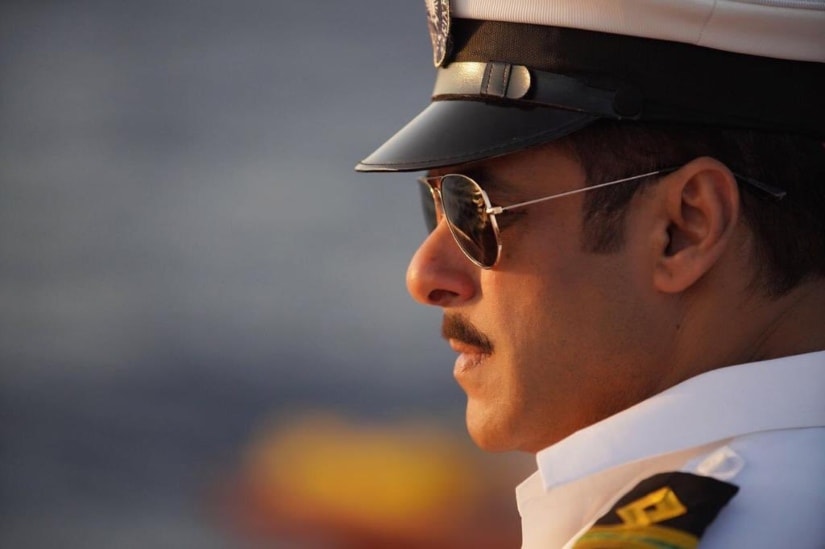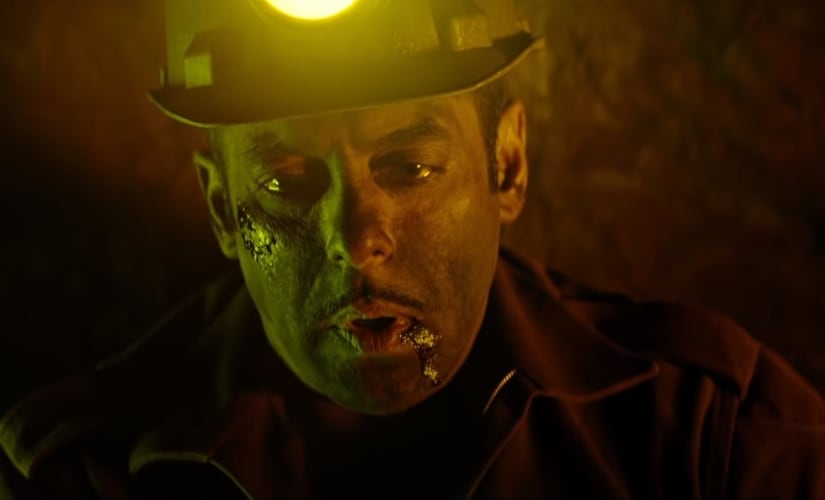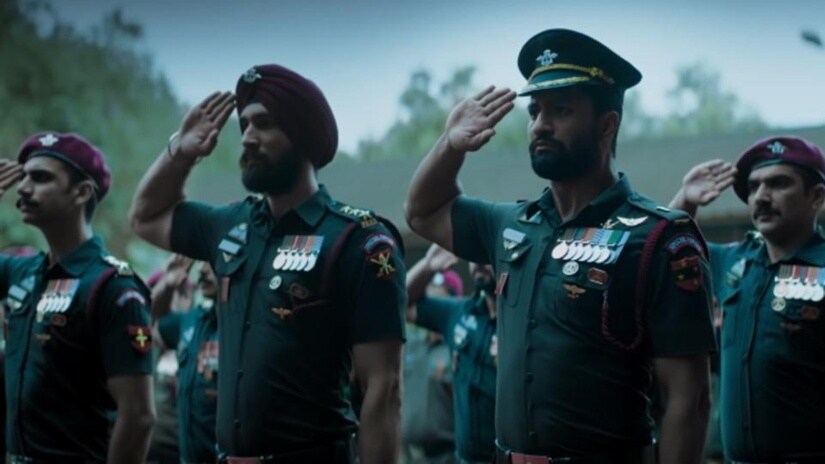Salman Khan is the biggest star in Hindi cinema today, and this means that films like Bharat need to be interpreted rather than reviewed. Indian film stars fulfil a historical imperative in that their films mythologise aspects of contemporary experience and, when the moment has passed, need to reinvent themselves. Dilip Kumar came close to method acting early in his career (Babul, 1950), eschewing stereotypes because of the existential freedom implied by Independence – the sense that one could choose one’s actions instead of simply conducting oneself in accordance with given social roles. One catches the actor in these early films poised in the act of deciding about affiliations, life still stretching out before him. But he soon moved away to playing the rustic stereotype in Naya Daur (1957) and continued with conventional acting (Ganga Jumna, 1962). Amitabh Bachhan’s Angry Young Man phase lasted only for a few films, when the marginalised needed to be represented. Shah Rukh Khan moved away from his early facetious, self-deprecating roles (Dilwale Dulhaniya Le Jayenge, 1995) and became unrecognisable later in his career (Raees, 2017).
The biggest male stars of any era embody social anxieties and expectations, and one cannot ‘evaluate’ their performances; what they ‘are’ is vastly more important than what they ‘do’.
The woman star is less important here because of the patriarchal foundations of Indian film entertainment. They gain significance when ‘feminine struggle’ is the issue dealt with, as in Andaz (1949), Dhool Ka Phool (1959) or Aradhana (1969). Salman Khan’s importance is of a slightly different order, because he gained stature when Bollywood had split into two different kinds of cinema – the first catering largely to an English-speaking public (3 Idiots, 2009) with spending power, because of the rise of the new economy, and another one that tries to resist ‘Anglophone India’ (Dabangg, 2010). Where Hindi cinema had hitherto been undifferentiated and pan-Indian, the rise of the multiplex and the growing gap between what different audiences paid for saw an Anglophone cinema and a non-Anglophone cinema emerging separately, Anglophone cinema thriving in the cities and the other kind meant for the smaller towns. [caption id=“attachment_6801521” align=“alignnone” width=“825”]  Salman Khan in a still from Bharat. Facebook/BharatMovie2019[/caption] Anglophone cinema is recognisable from the English titles and chunks of English language dialogue. The association of non-Anglophone cinema specifically with small towns may be an oversimplification, since there has been mass migration to the metropolises and it does well in the metropolises too. But the important issue here is that Salman Khan reigns in the non-Anglophone film world, which is why his hesitation with English is often a way of defining a Salman Khan protagonist. Bharat is a historical epic about an elderly person of today recollecting his own past, beginning with Partition. Bharat (Salman Khan) is a boy named after the future country by his father Gautam Kumar (Jackie Shroff), in charge of a railway station in present-day Pakistan. When trains arrive on the eve of Independence loaded with corpses, the family escapes to the Indian side, but the little daughter Gudiya and the father are both lost. Bharat comes to Delhi with his mother, and they take up residence with their aunt who owns a ration shop in Old Delhi, his father’s words entrusting the family to him ringing in his ears. Bharat’s journey (with his childhood friend Vilayati Khan) is shown in terms of spectacle and his earliest venture as an adult is as a circus motorcyclist in what used to be termed the ‘well of death’. The circus eventually closes down and Bharat needs to find a job that will earn him enough to keep him from penury. At virtually every point the film emphasises Bharat’s economic status, which is ordinary working-class. What marks him out is his heroism in every situation, rather than access to huge resources. Bharat’s next venture is to join a team headed for the Gulf and drill for oil, and his chief engineer is Kumud Raina (Katrina Kaif). On the field Bharat is once again heroic – rescuing his team trapped underground – and his chief engineer duly falls in love with him and publicly proposes marriage. Bharat, however, cannot agree because of the promise given to his father, who entrusted him with the family. Bharat’s middle-eastern sojourn happens in the 70s and the film tries to similarly date the protagonist’s career chronologically, but there is little evidence of contemporary ground-level happenings in India. One does not catch any mention of Indira Gandhi and the Emergency, or the violence in Punjab.
The protagonist being named after the nation implies allegory, but the nature of the allegory remains uncertain.
The ‘Russian Circus’ in the first part can perhaps be read as India’s socialist phase – but only with effort. The same problem with the oil exploration: Indians heading for the Middle East is not significant historically. Later on we have Bharat in the merchant navy going around the world and also encountering Somali pirates. None of these episodes can be read fruitfully as allegory and we are left to conclude that creating period atmosphere would have been expensive and the film solved it by showcasing unchanging locales, like the desert and the ocean. Still, the ploy does help communicate a sense of India/Bharat in the world, rather than India/Bharat preoccupied only with itself. [caption id=“attachment_6801551” align=“alignnone” width=“825”]  The class of audience Bharat is primarily addressing is evidently not the Anglophone one. Youtube screenshot[/caption] The class of audience Bharat is primarily addressing is evidently not the Anglophone one. When in the Middle East, Bharat speaks out against the whites for their ill-treatment of Indians and he speaks in English, but again with hesitation. A point is made here that he can learn English if he so desires, but his loyalty is to his own kind. Bharat wooed by an educated woman of a higher class is also directed towards the same audiences and their apparent pride in what they are. It is significant that while Bharat consents to a ‘live-in’ relationship with chief engineer Kumud Raina, he never marries her. Marriage to someone above himself might have moved him out of his class and he needs to show solidarity with it. A recurring theme in the film is ‘Hind Ration Shop’ owned by Bharat’s aunt, which vested interests are trying to acquire. ‘Ration shop’ is a deliberately humble enterprise connected to the poor and needy. What the film is deliberately doing is to address the element of pride in its chosen lower-placed public and doing it effectively. If it is also going international, it remains working-class in aspiration; where an Anglophone film might have had a London hedge fund manager as protagonist, Bharat has an oilfield worker and sailor. An aspect that merits comment here is the laudable showcasing of physical work, a phenomenon one rarely encounters in Indian cinema where physical work is ‘hardship’. The camera’s focus on Salman Khan’s muscular shoulders when he is working is significant here: his body is the ‘site’ where the gazes of this targeted audiences are made to converge. I will also add that physical work outside India has an element of glamour that such work inside the country would not; for Salman Khan to be the working-class ideal, he needs glamour as a component. The film began with the break-up of the family and Bharat has been hoping for his father and sister’s return. Kumud Raina now becomes Creative Director of Zee Television, which puts out a programme reuniting families separated in Partition. The emotional reunions take place at Wagah border, where hopeful people from both sides assemble. This is the moment when Bharat meets Gudiya (Tabu), now married and living in London. She comes all the way from London to see her family, although she remembers very little and only later is her identity confirmed. The director Ali Abbas Zafar plays safe here by making her the adopted daughter of British parents; making her Pakistani might have been risky. Immediately after this is an episode that one does not quite relate to. Bharat is attacked by four motorcyclists and one’s immediate thought is that they might be people who resent his reuniting of Partition families. We do not quite have a sense of the period this is set in and I suspect the ploy to make it seem contemporary is deliberate. But the attackers turn out to be hirelings of the vested interests trying to acquire Hind Ration Shop to put up a shopping mall. Bharat and Vilayati duly outsmart them, but they know they cannot hold on to the property much longer. It will have to be used for the common good of the local residents. [caption id=“attachment_6801591” align=“alignnone” width=“825”]  While Uri targeted Anglophones and was ‘patriotic’ in nature, Salman Khan’s Bharat primarily addresses the working class and is ’nationalistic’. Youtube screenshot[/caption] Bharat is ‘nationalist’ in intent, rather than ‘patriotic’ and, to make a distinction ‘nationalism’ celebrates nationhood while ‘patriotism’ is directed outward against a deemed enemy. Going by this definition ‘patriotism’ is a new phenomenon since even Upkar and Border had other emphases. Upkar took off from Shastri’s ‘Jai Jawan, Jai Kisan’ rhetoric, while Border was essentially about a soldier’s duty. In both films Pakistan was only incidental and not implicated in the plot, but this year’s biggest blockbuster Uri: The Surgical Strike is a different matter – in that Pakistan is central to the plot. On comparing Uri and Bharat in their treatment of India two things stand out. The first is that Bharat tries to look at India in the world, while Uri looks at it only in relation to Pakistan, aiming much lower. The second aspect relates to the patriotic Uri targeting Anglophones, given the title and chunks of English spoken. Bharat describes workers while Uri deals only with the highest echelons; virtually everyone in the story is within handshaking distance of the Prime Minister. Nationalism, because it is motivated by a sense of common nationhood, is arguably a nobler emotion than patriotism, which proceeds by demonising an external enemy. It may be politically significant that a film primarily addressing the working class is ‘nationalistic’ while one targeting a better-placed and educated public is ‘patriotic’. MK Raghavendra is a film scholar and author of seven books including The Oxford India Short Introduction to Bollywood (2016)


)
)
)
)
)
)
)
)
)



